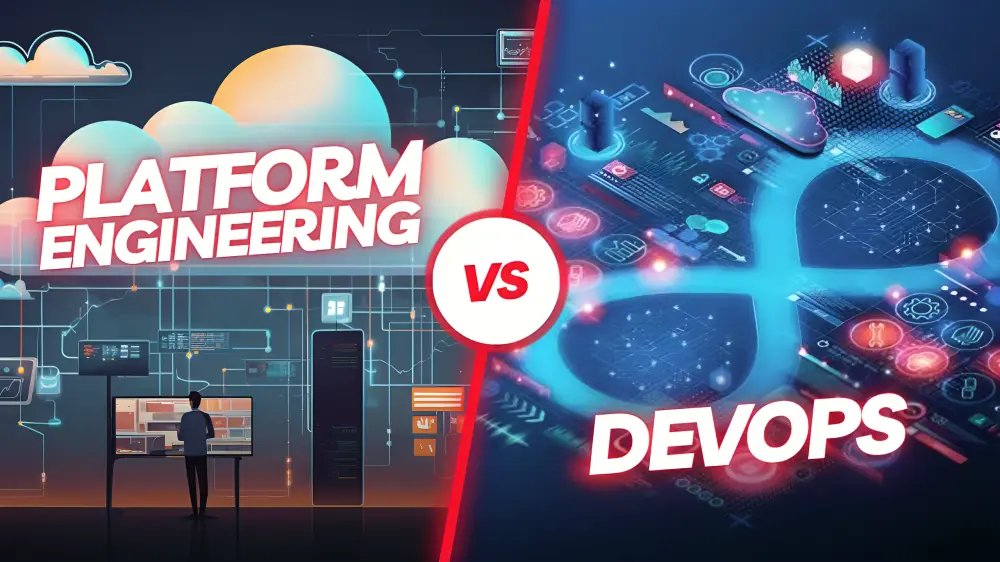New approaches and techniques are constantly being developed in the dynamic fields of software development and IT operations to increase productivity. Two such paradigms, Platform Engineering vs DevOps, have drawn a lot of interest. Although they both seek to improve operational excellence and software delivery, their strategies and areas of emphasis are different. This article explores the fundamentals of DevOps and Platform Engineering, emphasizing the differences and advantages between them.
What is DevOps?
Software development and operations are combined in DevOps, as the name implies. Encouraging improved communication and collaboration throughout the development and delivery processes is the plan to maximize both of these areas.
Among the essential components of DevOps are:
- Collaboration: At its foundation, DevOps is a team effort. For the company to develop, maintain, and distribute software and apps more quickly and effectively, it is intended to remove obstacles between teams working on different tasks and encourage better teamwork.
- Automation: DevOps should ideally also make intelligent use of automation. Anything that eliminates the need for team members to manually get involved in tasks like release management, deployment, and testing is going to be beneficial.
- Continuous integration: Things start to get interesting at this point. Software development lifecycles can be streamlined and accelerated with the help of continuous integration and delivery/deployment (CI/CD), particularly when maintaining “always-on” applications. Updates, fixes, patches, and versions of source code are all automatically integrated into a shared repository via continuous integration (CI).
- Monitoring and logging: Determining the source of the issue and resolving it correctly the next time are typically the most challenging tasks. Teams find it much simpler to keep track of important information and monitor processes thanks to DevOps’ emphasis on communication and collaboration. This includes using development, release, and update logs.
- Infrastructure as code: This is the process of using code itself to create, configure, and manage system access to computational resources as opposed to using tools or hardware configuration. When managing large-scale, distributed systems, cloud-native apps, or service-based architecture, this method is extremely helpful. The management and provisioning of cloud infrastructure can be automated to reduce human error, optimise resource allocation, accelerate deployment, and free up engineers’ time for more important work.
- Scalability and flexibility: When DevOps is done correctly, your team will be far more adaptable and quick to address issues as they come up. They’ll be able to communicate quickly to resolve unforeseen modifications or problems with operations. Naturally, this implies that they will have much greater long-term scalability.
- Feedback loops: Lastly, learning and development are the cornerstones of DevOps. Instead of a reactive firefighting cycle of back and forth, it establishes a continuous feedback loop. You receive feedback quickly, you can act upon it quickly, you can solve issues as they arise, and you can incorporate all of your experience into your work procedures to prevent making the same mistakes repeatedly.
DevOps Practices, Tools, and Their Impact on Software Development and Operations
- Continuous Integration and Continuous Delivery (CI/CD): The processes of continuous delivery (CD) and continuous integration (CI) enable developers to regularly merge their work into a shared repository. Releases are faster and more reliable when builds and tests are automated. This approach accelerates the release cycle, improves product quality, and reduces development time.
- Infrastructure as Code (IaC): By approaching infrastructure like software code, Infrastructure as Code (IaC) transforms infrastructure management. This method improves the scalability and consistency of computing resource management. These procedures require the use of tools like Ansible, Docker, Kubernetes, and Jenkins, which facilitate quicker deployment times and more efficient workflows.
- Infrastructure Monitoring and Management: In a DevOps environment, integrating infrastructure monitoring tools is crucial. By offering real-time insights into the functionality and condition of the infrastructure, these tools promote high availability and proactive problem-solving. For monitoring, programs like Prometheus, Grafana, and Elastic Stack are frequently utilised. Platforms such as Qovery can be helpful in this regard. Qovery is an all-in-one solution for contemporary DevOps practices because of its unique combination of infrastructure monitoring, cloud service simplicity, and application deployment.
Platform Engineering vs DevOps Approaches
DevOps Approach:
- Emphasizes the continuous automation of the software development lifecycle, encompassing testing, deployment, and infrastructure modifications, to integrate development and operations.
- Encourages better communication and problem-solving by dismantling communication silos between the operations and development teams and fostering a collaborative culture.
- Emphasizes flexibility and continuous improvement while putting in place agile processes to react swiftly to changes in the software environment.
Platform Engineering approach:
- Makes use of Infrastructure as a Service (IaC) to enable scalable and repeatable development environments through consistent and error-free infrastructure provisioning and management.
- Creates self-service tools and platforms that enable developers to independently install the infrastructure and services they need, increasing productivity and creativity.
- Focuses on developing standardized governance models and environments to guarantee operational effectiveness, security, and compliance across development projects.
Platform Engineering vs DevOps Focus
DevOps Focus:
- Stresses the use of continuous delivery and integration (CI/CD) techniques.
- Intends to reduce the duration of software development.
- Fosters a culture of cooperation between operations and development.
Platform Engineering focus:
- Creates and oversees a group of tools or a common platform for software deployment.
- Focuses on the infrastructure needed to support the creation and use of software.
Platform Engineering vs DevOps Methodologies
DevOps methodology:
- Incorporates practices, culture, and tools for improved teamwork.
- Makes use of CI/CD to update software continuously and effectively.
- Puts into practice procedures for delivering software quickly and reliably.
Platform Engineering methodologies:
- Uses automation to make infrastructure management more efficient.
- Focuses on developing services and tools that give developers more power.
Conclusion
While both Platform Engineering vs DevOps aim to enhance software delivery and operational efficiency, they diverge in strategies and priorities. DevOps emphasizes continuous automation, collaboration, and agile processes, whereas Platform Engineering focuses on scalable infrastructure, self-service tools, and standardized governance. Understanding these differences is vital for optimizing software development practices.





